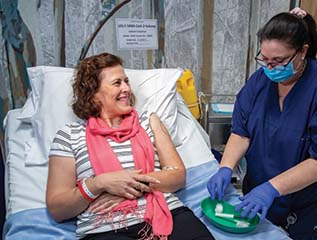Development of mRNA Vaccines
The coronavirus pandemic has brought into stark realisation the vulnerability of the world’s population and economy to major human infectious disease threats.
With the tragedy and suffering from over 5.6 million COVID‑19 deaths and over 286 million cases globally as of January 2022 and estimates of US$28 trillion in lost economic output by the end of 2025, we know that the potential scale of any future threat will be immense and devastating on many levels (WHO; World Bank).
Beyond the threat of viral diseases, the withdrawal of global pharmaceutical companies from antibiotic development in the 1980s, combined with the increasing prevalence of bacterial antibiotic resistance, has severely eroded the capacity to effectively prevent and treat infections caused by bacterial pathogens, leading to increasing numbers of infection-related deaths in the Australian population. Driven by antimicrobial resistance, infectious diseases will become the leading underlying cause of human mortality in Australia by 2050.
This scenario underscores the importance of programs such as UQ’s mRNA vaccine development program which will combine
UQ infectious diseases expertise with Moderna mRNA vaccine technology to target multiple infectious diseases. The program will provide investment in critical expertise focussed on mRNA technology, vaccine delivery, bacterial vaccine genomics and vaccine immunology.
Furthermore, we will additionally investigate the potential vaccine delivery to the skin using a key Australian invention, the high-density microarray patch (HD-MAP), in collaboration with the local UQ spin-out company, Vaxxas.
Through strategic partnership with Moderna, Vaxxas, BioNet Asia and Technovalia, and by closing existing technology gaps, the program will mobilise expertise and infrastructure, to build the technical proficiency, capacity, structures and systems needed to respond rapidly and effectively, to current and future global infectious disease emergencies.

Program Details
Program lead
Professor Mark Walker
Download
Program Fact Sheet
Program queries
mark.walker@uq.edu.au
HERA queries
hera@research.uq.edu.au
